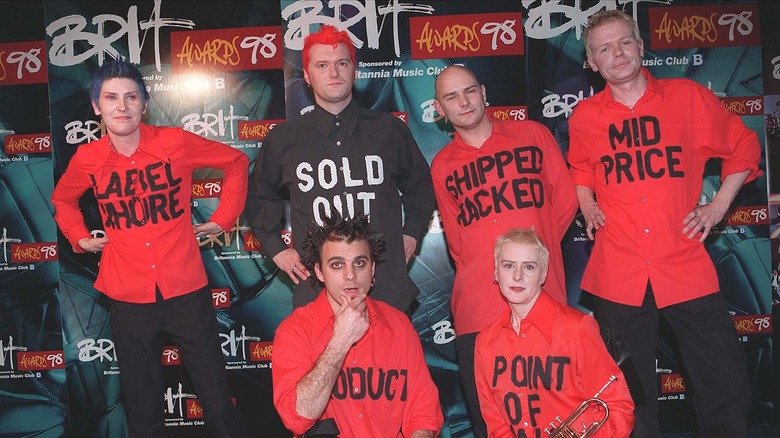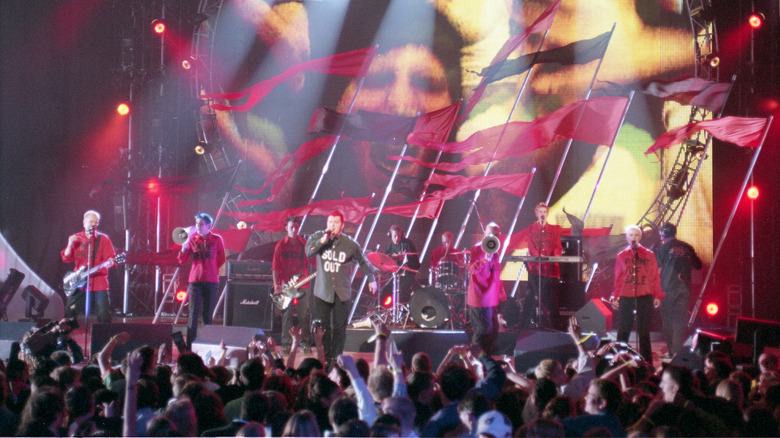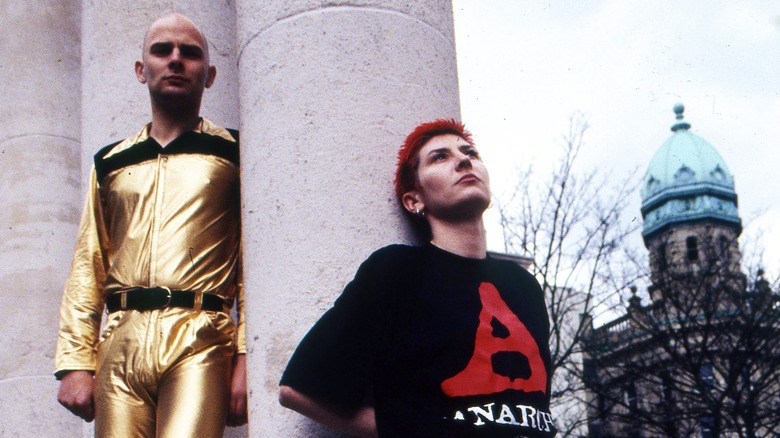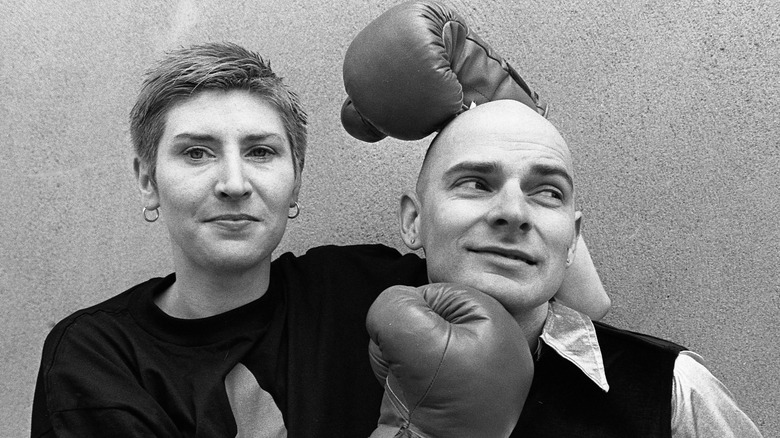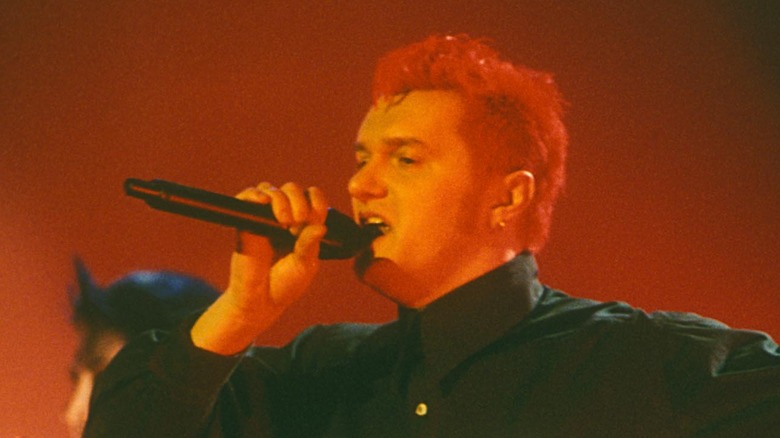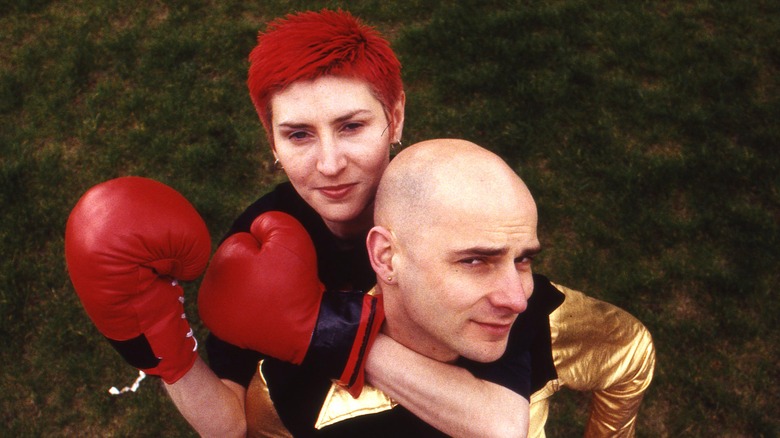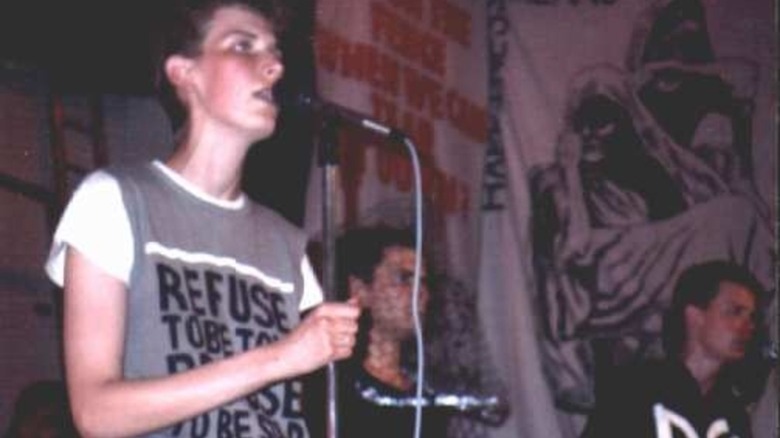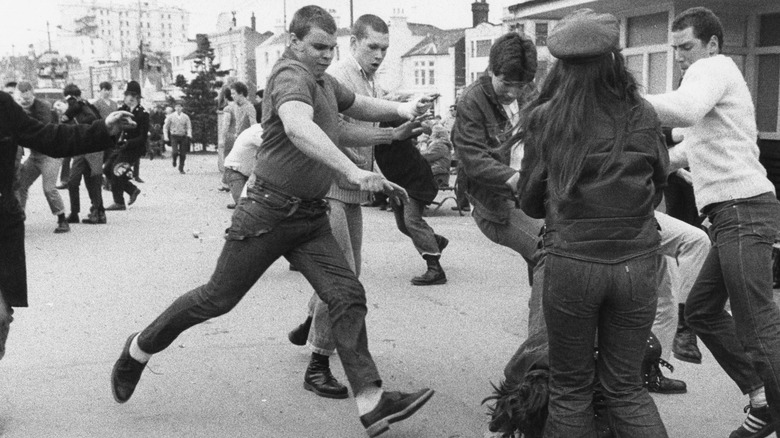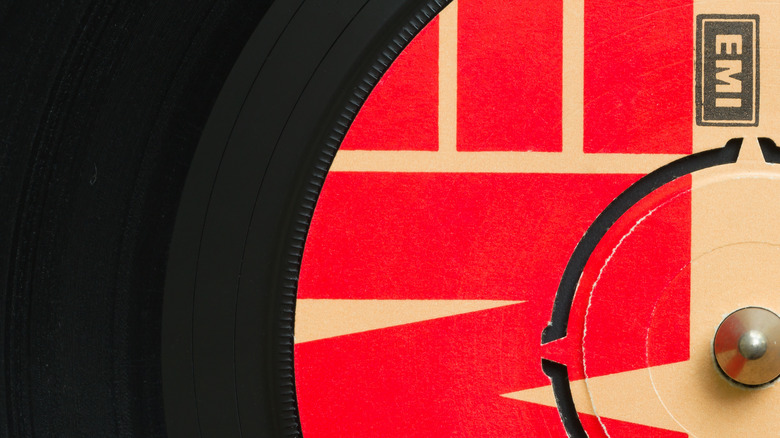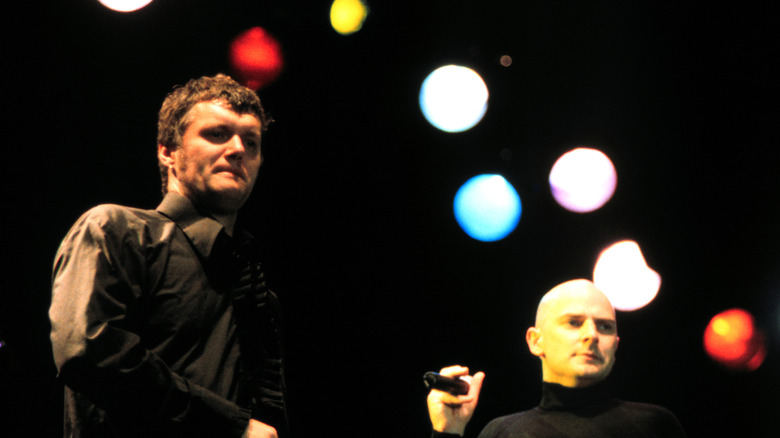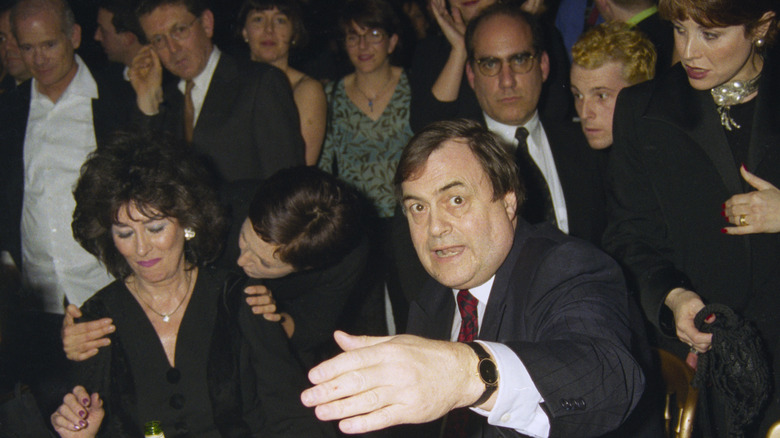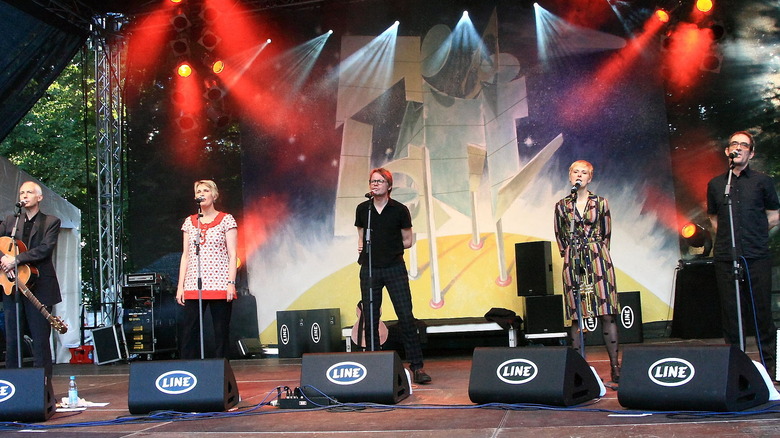The Untold Truth Of Chumbawamba
Chumbawamba shot to international fame in 1997 with their upbeat party jam "Tubthumping." The song was ubiquitous in the late '90s, spending nine weeks at #1 on the Billboard pop chart. Guitarist Boff Whalley explained to the Guardian, "To 99% of people we just had that one song." "Tubthumping" doesn't have any immediately obvious political message. Its title can be defined as "noisy, violent, or ranting public speaking," but its lyrics are more about the joys of drinking than any particular political beliefs. While band members have been quick to stand by their hit, it was very different from their usual work.
That's because Chumbawamba was "an anarchist collective" making punk rock music to spread the word about their beliefs. Like all of the group's songs, "Tubthumping" was written by the members of the band as a collective, as described in the Guardian. While most people know them for that one hit, their other songs are titled things like "The Day the Nazi Died" and "In Memoriam: Margaret Thatcher" (both joyous, sarcastic celebrations at the idea of their enemies' deaths). They typically played their music at strikes and on picket lines.
A series of unlikely events and coincidences thrust the anarchist collective into the public eye – but fame didn't change the band. Chumbawamba stuck to their anarcho-communist guns for their entire 3-decade-long career.
Chumbawamba were anarchists
Chumbawamba made music, but they were always an anarchist collective before they were a band. Throughout their decades-long career, in obscurity or fame, their commitment to their radical principles never wavered. As described by Aaron Lake Smith, the writer/editor who released an extensive series of zines on the band's history, Chumbawamba was particularly interested in bringing the movement to the people. Sometimes they did this through music, but other times it was through political activism.
The liner notes on the "Tubthumping" album described their profound dislike for people who engaged intellectually with political ideas but failed to take action, calling it, "Lifestylism ... the practice of wrapping yourself in a blinkered, self-perfecting, ideologically-sound cocoon." It condemned those who stayed in their bedrooms, making "pronouncements on how other people should live” and criticizing people on their own side for not being ideologically pure enough, while ignoring their true enemies.
While the band was unwilling to compromise on their beliefs for fame, they were willing to adjust their message to make it more accessible to the working-class people they championed. As described in the documentary, "Well Done. Now Sod Off," at the beginning of their career they were pacifists who talked about animal rights often, but over time reevaluated both positions. One reason is that, after the British Miners' Strike, they spent much of their time promoting solidarity with organized labor. Their hardline stance against eating meat was alienating to the people they were trying to support. They also changed their stance towards pacifism, and supported anti-apartheid bombings.
They were punk (kind of)
Chumbawamba was mostly about class politics, and as such spent more time on the picket line than in the music scene. The band is generally considered punk, and was influenced by classic punk acts like The Clash and Sex Pistols, as well as the influential anarcho-punk band Crass. As noted by guitarist Boff Whaley in an interview with The Guardian, however, Chumbawamba was always interested in a different kind of music. "We wanted to sing harmonies and have singalong choruses."
Unfortunately, "I couldn't play any instruments..." Whaley explained. "But then when punk happened it was like, oh right, you don't need to know how to play an instrument."
Over time, the band became more familiar with their instruments and their sound evolved, but at the beginning, the members of Chumbawamba had very little musical experience. As described in the 2000 Chumbawamba documentary, the band's instruments were out of tune, and it seemed like they didn't actually know how to tune them. They started recording albums before they figured out this basic part of being in a band. An engineer, who described Chumbawamba as "a gang of anarchists," helped them record their first album, but it took him a while to realize that's what they were doing. He explained, "I didn't actually realize they were trying to be musicians. I thought they were some kind of circus troupe."
They all lived together
The band lived together in an old falling down building together, which, according to a documentary on Chumbawamba, was known to the neighbors as "the house with weirdos in." It was a red brick building with old farming machinery in the yard. The household had strict rules, including that no meat was allowed in the building. The group already lived together before they made music, but the housemates would eventually become bandmates.
Their home had been a derelict abandoned building, but the group "squatted" in the house communally. While vocalist Dunstan Bruce admitted the place was "an absolute wreck," he explained that it was "trash" when they moved in. The band spent a lot of time and money repairing the house and decorating it in their preferred style. The handmade sign in their home practice room declared: "No war but the class war."
The band didn't just share a house, they shared everything. They worked odd jobs, and whenever one of them was paid, they put it into a communal pot that everyone in the house owned. According to people who knew them at the time, everything, even clothing, was owned by the group, not by any individual. This feeling of communal ownership extended to their music. As guitarist Boff Whalley explained in an interview, they wrote all of their songs collectively.
They started Chumbawamba as a joke
The future members of Chumbawamba were together as an anarchist collective before they ever tried their hands at music – but that didn't stop them from pretending to be a band when the moment came.
Longtime collaborator Simon Lanzon explained in a documentary about the band that he had been trying to put together a musicians' cooperative. The group went to a meeting and when Lanzon asked how many people there were in a band, the group raised their hands "for a laugh." They were punk, however, and everyone believed them. When they were asked to write down their band's name and members, they listed themselves as members and decided they were called "Chimp Eats Banana."
Shortly after, they got a call confirming that they had a gig in two weeks. No one in the group knew how to play an instrument, so they assigned each other roles almost randomly. They borrowed instruments and played the gig. "With punk you could do that," Whaley explained. "Before that you had to practice. You had to want to be in a band."
Nobody knows what their name means
Even though most people know Chumbawamba from their big hit, the band is also often remembered for their name. There are lots of different stories about what "Chumbawamba" means – and that didn't happen by accident.
The band was officially dubbed "Chumbawamba" in 1982. As described by Jacobin Mag, they initially changed their musical style with every gig (which they apparently sometimes performed with toy instruments). The band also changed their story about the origin of the band's name.
It became a running joke between the bandmates to see who could tell the most ludicrous story about the band's name. In his memoir, Boff Whalley claimed that "Chumbawamba" was an African drumming chant they'd heard busking in Paris. Vocalist Danbert Nobacon said that it came from a dream he had, in which he tried to use a public bathroom, and instead of gender designations, the signs on the doors said "Chumba" and "Wamba." As stated in the episode of "One Hit Wonderland" about "Tubthumping," the name is almost certainly just a nonsense word with no inherent meaning.
They had a sense of humor
"Onstage, I don't think we looked like we were having fun early on," drummer Harry Hamer said in the documentary "Well Done. Now Sod Off." Unlike many of their punk contemporaries, Chumbawamba's approach to political music was snarky and sarcastic.
The band's transformation into a truly political punk band came with Prime Minister Margaret Thatcher's anti-union and anti-worker policies. Guitarist Boff Whalley explained, "Thatcher's attack on social conditions, whether it was work or arts, or whatever was so obvious and so in your face that it meant even the most ignorant of people had to wake up and think, 'ah, it's me. I'm getting attacked.'"
The band continued to be overtly political, but they also infused their work with a sarcastic sense of humor. One track, titled "Scab Aid" uses the melody of the Beatles' "Let It Be," and mocked the very concept of charity singles, with the lyrics, "Nothing sells like disaster/let it be." It was released the week after an actual charity single, in the style of "Live Aid." They also released an EP titled "In Memorium: Margaret Thatcher," to be played on the Prime Minister's death. It included an upbeat song with the lyrics, "So long, so long/you kept me waiting so long/let me serenade you with one last song/you're back where you belong" and the Wicked Witch of the West's theme from "The Wizard of Oz."
They tricked skinheads
Chumbawamba was an explicitly anti-fascist band. Usually, they made their feelings about fascism and racism explicit, with tracks like "The Day the Nazi Died" which calls for rooting out and eliminating Nazi ideology that survived the end of World War II. On one occasion, however, they kept their ideology a secret, so that they could infiltrate the growing movement of skinhead punks known as "Oi!"
Oi! was a punk music movement brewing in late '70s Britain. It formed in opposition to the bands with "pretentious lyrics" that were attractive to the music press, and as noted by the Guardian, received the unflattering nickname "Punk's stunted idiot half-brother." Its bands' names were often crudely humorous, the shows were notable for brutal brawling, and a growing number of its fans were far-right extremists. The genre was especially attractive to Neo-Nazi Skinheads. The music journalist Garry Bushell, who championed Oi!, explained that there was a "Nazi subculture all the way through punk. Malcolm McLaren [the manager of the Sex Pistols] started it all with the swastikas, which thick people saw and thought, 'Oh, they must be Nazis.'"
A documentary about the band details how Chumbawamba once invented a fake band called Skin Disease and recorded an Oi! song, which they tricked the press into believing was legitimate. As described by Boff Whalley, the single was called "I'm Thick," and consisted of them shouting the title over 60 times.
Chumbawamba was signed by EMI
The major shift in the career of Chumbawamba came when they signed with behemoth British record label EMI. Many fans felt that Chumbawamba had sold out their principles. The band had a years-long history of hating EMI. As detailed by Aaron Lake Smith in his retrospective about the band published in Jacobin Mag, after they learned EMI had been involved with manufacturing weapons in apartheid South Africa, they appeared on a 1989 album called "F-CK EMI." Once, they had even smeared blood on the outside of the EMI building. As much as they obviously hated EMI, they were having issues with their own indie label – which had just told them that they wouldn't be releasing the "Tubthumper" album unless they re-recorded it to be more traditionally punk. Then EMI offered Chumbawamba what would be the equivalent of almost $250,000 to sign.
There was deep debate within the band. They knew it would upset their fans and make it seem as though they cared more about money than their beliefs. Ultimately, Chumbawamba decided that they could reach more people with the exposure that came with a major label.
The decision transformed the underground band that had been going for over 10 years into international pop stars with "Tubthumping." Rather than going corporate, however, the band became more outspoken and militant in the face of their success.
Chumbawamba encouraged fans to shoplift their CDs
Chumbawamba might have gotten paid thousands of pounds to sign with EMI, but the band proved they didn't care about the money when they encouraged people who wanted the "Tubthumper" album to steal it.
The band had a history of shoplifting from before they were stars. Drummer Harry Hamer explained that the band used to have "shoplifting competitions" to see who could steal the largest and unlikely items. Alice Nutter (who was a vocalist for Chumbawamba for 20 years and is now a successful television writer) stated in a documentary that she wasn't particularly good at shoplifting, though she always wanted to be. She might not have been winning the band's contests, but it was Nutter who caused a media flurry around the band. During an interview, she suggested that fans could steal their album if they wanted to – though only from big chain stores.
"You're expected to condemn [shoplifting]," Nutter recalled in 2000, "You're expected to say that all stealing is wrong, and all stealing isn't wrong."
The band supported causes
Chumbawamba might have gone mainstream with their hit "Tubthumping," but they didn't water down their message for their new fans. As noted by the Phoenix New Times, band members talked openly about their beliefs in TV interviews. They sold out amphitheaters and played their old anarchist songs. They used their new international platform to promote their favorite causes. The band had a long history of supporting causes they cared about. Aside from their pro-union stance, they also played benefits for animal rights and gay rights. They even wrote an upbeat pop tune with harrowing lyrics titled "Homophobia" about the hate crime that killed a young gay man.
"When [Tubthumping] went global ... we made a decision about what we would do, having that platform," vocalist Dunstan Bruce told Democracy Now, "We've got to do something with it ... How often does anybody get that sort of global audience?" On talk shows, they sometimes changed their hit's lyrics to support Mumia Abu-Jamal, a journalist and former leader of the Black Panther Party who had been accused of murder and put on death row. When the band was offered $100,000 from GM to use one of their songs in an ad, they agreed – but only so that they could donate the money to a variety of anti-corporate charities.
If you or a loved one has experienced a hate crime, contact the VictimConnect Hotline by phone at 1-855-4-VICTIM or by chat for more information or assistance in locating services to help. If you or a loved one are in immediate danger, call 911.
They once threw water on a politician
In 1998, Deputy Prime Minister John Prescott attended the Brit Awards. Chumbawamba was performing at the music awards show. During the event, the band's vocalist Danbert Nobacon dumped a bucket of cold water over Prescott. Later, the band would stand by their actions, saying, "If John Prescott as a representative of the Government has the nerve to turn up at events such as the Brit Awards in a vain attempt to make Labour seem cool and trendy, he deserves all we can throw at him."
As described in a report from the Guardian, both Nobacon and Alice Nutter were taken out of the award show by security and turned over to the police. It's likely that this didn't bother the band. In 2000, Nutter told a documentary interviewer that at some demonstrations it felt like "you'd failed if you didn't get arrested. It took me quite awhile to realize that it weren't cool to get caught." Prescott didn't file any formal complaints about having water poured on him, but he did release an accidentally amusing statement claiming it was "utterly contemptible that his wife and other womenfolk should have been subjected to such terrifying behavior."
As described in PinkNews, they were no less appalled when Nigel Farage used "Tubthumping" in 2011. Multiple former members spoke up to express their outrage at the misappropriation of the music, including Nutter, who referred to Farage as "an arse" from a party "mainly made up of bigots."
Chumbawamba went for 30 years
"If there were ever a Chumbawamba manifesto, it would read in the inconsistent, contradictory language of the Dadaists – part strident belligerence and part foolishness," the band stated on their website, "The ending is no different; it comes almost as much of a surprise to us as it may do to you."
While the band is sometimes thought of as a "one-hit wonder," their career actually lasted for 30 years. During their multi-decade run, they lived, wrote, recorded, and performed around the world together, as equals in every part of their collective.
The group announced their decision to end the group in 2012, saying that they'd reached the point where they didn't feel they were able to commit to the amount of "time and enthusiasm" a band like Chumbawamba required. The band has not yet reunited for another album, but in May of 2021, Dunstan Bruce announced that for the past five years he had been working on a documentary about the band.
